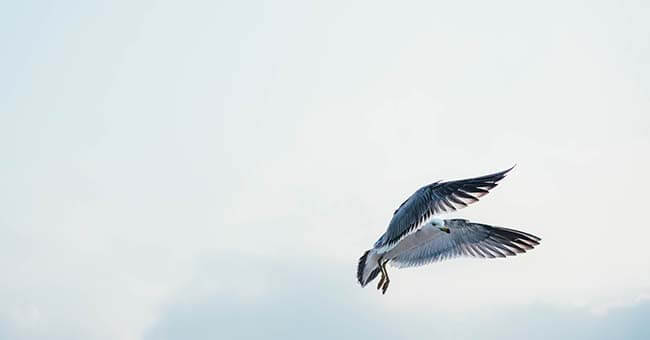If you want a cuddly introduction to the Taoist philosophy of Wu Wei (“effortless action”), start with the Tao of Pooh written by Benjamin Hoff (1982).
Inspired by the characters of the all-time classic Winnie the Pooh, Hoff shows how the beloved Pooh-bear is actually a Taoist, simple-minded but not stupid, appreciates and accepts life situations as they come. The Taoist master is in contrast with the Clever Rabbit who often over-thinks to the point of confusion, the Scholarly Academian Owl who learns intellectually and indirectly through books, and the Emotional Eeyore who likes to complain pessimistically and frets about existence. The charming characters were intended as metaphor for the human nature, as Hoff mentioned: “within each of us there is an Owl, a Rabbit, and Eeyore, and a Pooh. For too long, we have chosen the way of Owl and Rabbit.”
The 50+ quotes below will help you not be Owl, Rabbit and Eeyore, follow the way of Pooh, and get things done effortlessly.
Table of Contents
About Clever Rabbit
1. The thing that makes someone truly different—unique, in fact—is something that Cleverness cannot really understand.
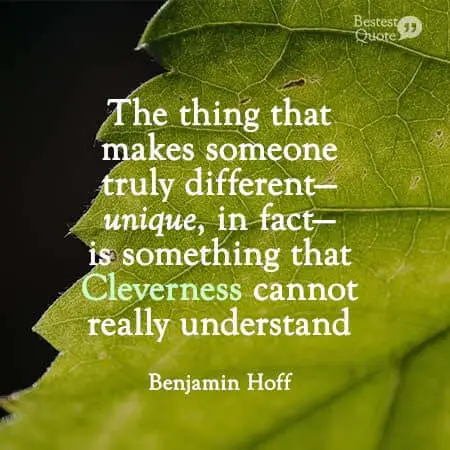
2. “Rabbit is clever … Rabbit has Brain… that’s why he never understands anything.”
3. “We’ve come to wish you a Very Happy Thursday,” said Pooh … “Why, what’s going to happen on Thursday?” asked Rabbit, and when Pooh had explained, and Rabbit, whose life was made up of Important Things, said, “Oh, I thought you’d really come about something”
4. Remember when Kanga and Roo came to the Forest? Immediately, Rabbit decided that he didn’t like them, because they were Different. Then he began thinking of a way to make them leave. Fortunately for everyone, the plan failed, as Clever Plans do, sooner or later.
5. Cleverness, after all, has its limitations. Its mechanical judgments and clever remarks tend to prove inaccurate with passing time, because it doesn't look very deeply into things to begin with. Benjamin Hoff, the Tao of Pooh Click To Tweet
6. “Unfortunately, some people – who always seem to think they’re smarter than fish and birds, somehow – aren’t so wise, and end up causing big trouble for themselves and others.”
About Owl as Intellect and Knowledge
7. “I think, therefore I am Confused.”
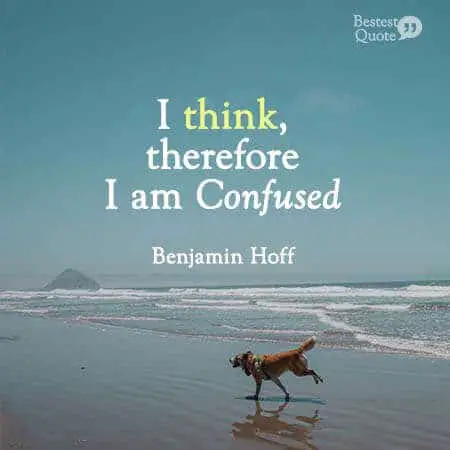
8. In China, scholars were generally Confucianist in training and orientation, and therefore often spoke a somewhat different language from the Taoists, who tended to see Confucianist scholars as busy ants spoiling the picnic of life, rushing back and forth to pick up the bits and pieces dropped from above.
9. Far from reflecting the Taoist ideal of wholeness and independence, this incomplete and unbalanced creature divides all kinds of abstract things into little categories and compartments, while remaining rather helpless and disorganized in his daily life.
10. Rather than learn from Taoist teachers and from direct experience, he learns intellectually and indirectly, from books. And since he doesn’t usually put Taoist principles into practice in an everyday sort of way, his explanations of them tend to leave out some rather important details, such as how they work and where you can apply them.
11. Those who have no compassion have no wisdom. Knowledge, yes; cleverness, maybe; wisdom, no. A clever mind is not a heart.Knowledge doesn't really care. Wisdom does. Benjamin Hoff, the Tao of Pooh Click To Tweet
12. The Confusionist, Desiccated Scholar is one who studies Knowledge for the sake of Knowledge, and who keeps what he learns to himself or to his own small group, writing pompous and pretentious papers that no one else can understand, rather than working for the enlightenment of others.
13. One sometimes gets the impression that those intimidating words are there to keep us from understanding. That way, the scholars can appear Superior, and will not likely be suspected of Not Knowing Something. After all, from the scholarly point of view, it’s practically a crime not to know everything.
14. To the Desiccated Scholars, putting names on things is the most vital activity in the world. Tree. Flower. Dog. But don’t ask them to prune the tree, plant the flower, or take care of the dog, unless you enjoy Unpleasant Surprises. Living, growing things are beyond them, it seems.
15. “Why does a chicken, I don’t know why.” Why does a chicken do what it does? You don’t know? Neither do we; Neither does anyone else. Science likes to strut around and Act Smart by putting its labels on everything, but if you look at them closely, you’ll see that they don’t really say much. “Genes”? “DNA”? Just scratching the surface.
See also: Love Lessons from Winnie the Pooh
About Eeyore as Emotion
16. “Nobody with a balloon can be uncheered”
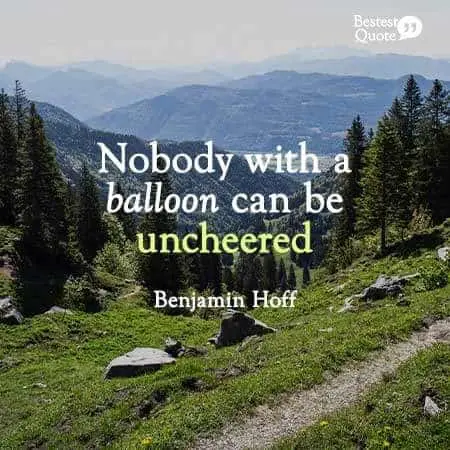
17. The Eeyore Attitude gets in the way of things like wisdom and happiness, and pretty much prevents any sort of real Accomplishment in life.
18. “It’s not that the Eeyore Attitude is necessarily without a certain severe sort of humor . . .
19. Eeyore, the old grey Donkey, stood by the side of the stream, and looked at himself in the water. “Pathetic,” he said. “That’s what it is. Pathetic.”
See also: Funny and Deep Lessons Calvin and Hobbes Can Give Us
What Is The Tao Of Pooh
20. “A fly can’t bird, but a bird can fly.” Very simple. It’s obvious, isn’t it? And yet, you’d be surprised how many people violate this simple principle every day of their lives and try to fit square pegs into round holes, ignoring the clear reality that Things Are As They Are.
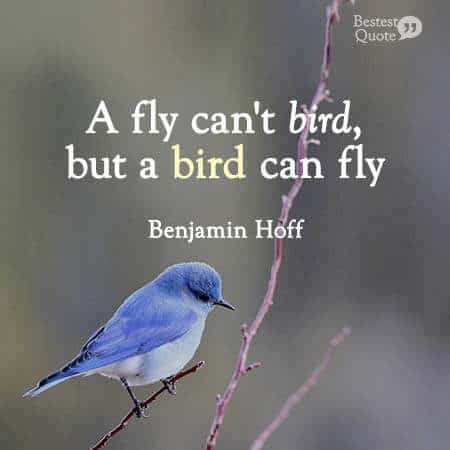
21. “The Tao of Pooh is about how to stay happy and calm under all circumstances”
22. “Pooh hasn’t much Brain, but he never comes to any harm. He does silly things and they turn out right.”
23. For I am a Bear of Very Little Brain, and long words Bother me.”
24. “A stream flows like water, reflects like a mirror… you need to let your mind flow along and reflect what it sees. Then it can respond with the answer.”
25. Today is my favorite day. Benjamin Hoff, the Tao of Pooh Click To Tweet
26. The surest way to become Tense, Awkward, and Confused is to develop a mind that tries too hard—one that thinks too much. The animals in the Forest don’t think too much; they just Are.
27. down through the centuries, man has developed a mind that separates him from the world of reality, the world of natural laws. This mind tries too hard, wears itself out, and ends up weak and sloppy. Such a mind, even if of high intelligence, is inefficient. It goes here and there, backwards and forwards, and fails to concentrate on what it’s doing at the moment.
28. “An Empty sort of mind is valuable for finding pearls and tails and things because it can see what’s in front of it. An Overstuffed mind is unable to. While the Clear mind listens to a bird singing, the Stuffed-Full-of-Knowledge-and-Cleverness mind wonders what kind of bird is singing. The more Stuffed Up it is, the less it can hear through its own ears and see through its own eyes. Knowledge and Cleverness tend to concern themselves with the wrong sort of things, and a mind confused by Knowledge, Cleverness, and Abstract Ideas tends to go chasing off after things that don’t matter, or that don’t even exist, instead of seeing, appreciating, and making use of what is right in front of it.”
29. If people were Superior to Animals, they'd take better care of the world. Benjamin Hoff, the Tao of Pooh Click To Tweet
30. Things just happen in the right way, at the right time. At least they do when you let them, when you work with circumstances instead of saying, “This isn’t supposed to be happening this way,” and trying hard to make it happen some other way.
31. “In the story of the Ugly Duckling, when did the ugly Duckling stop feeling Ugly? When he realized that he was a Swan. Each of us has something Special, a Swan of some sort, hidden inside somewhere. But until we recognize that it’s there, what can we do but splash around, treading water? The Wise are Who They Are. They work with what they’ve got and do what they can do.”
See also: Buddha’s Quotes on Love and Relationship
Returning to Simplicity (State of “The Uncarved Block”)
32. The nicest thing about that Simplicity is its useful wisdom, the what-is-there-to-eat variety— wisdom you can get at.
33. The essence of the principle of the Uncarved Block is that things in their original simplicity contain their own natural power, power that is easily spoiled and lost when that simplicity is changed.
34. Pooh can't describe the Uncarved Block to us in words; he just is it. That's the nature of the Uncarved Block. Benjamin Hoff, the Tao of Pooh Click To Tweet
35. For a long time they looked at the river beneath them, saying nothing, and the river said nothing too, for it felt very quiet and peaceful on this summer afternoon.
36. When you discard arrogance, complexity, and a few other things that get in the way, sooner or later you will discover that simple, childlike, and mysterious secret known to those of the Uncarved Block: Life is Fun.
37. From the state of the Uncarved Block comes the ability to enjoy the simple and the quiet, the natural and the plain. Along with that comes the ability to do things spontaneously and have them work.
See also Lao Tzu’s Quote: “Practice not doing, everything will fall into place”
How To Get Things Done Effortlessly (Wu Wei)
38. “Just how do you do it, Pooh?” “Do what?” asked Pooh. “Become so Effortless.” “I don’t do much of anything,” he said. “But all those things of yours get done.” “They just sort of happen,” he said.
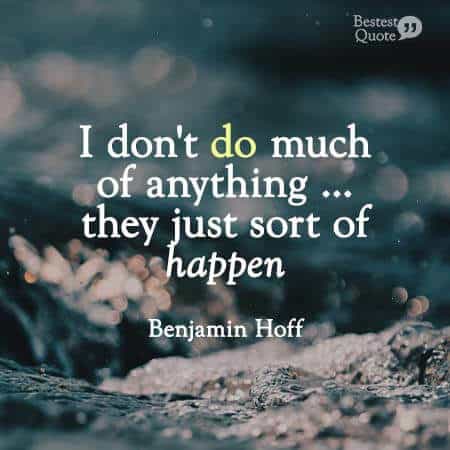
39. Literally, Wu Wei means “without doing, causing, or making.” But practically speaking, it means without meddlesome, combative, or egotistical effort. It seems rather significant that the character Wei developed from the symbols for a clawing hand and a monkey, since the term Wu Wei means no going against the nature of things; no clever tampering; no Monkeying Around.
40. The efficiency of Wu Wei is like that of water flowing over and around the rocks in its path—not the mechanical, straight-line approach that usually ends up short-circuiting natural laws, but one that evolves from an inner sensitivity to the natural rhythm of things.
41. “The Wu Wei approach to conflict-solving can be seen in the practice of the Taoist martial art T’ai Chi Ch’uan, the basic idea of which is to wear the opponent out either by sending his energy back at him or by deflecting it away, in order to weaken his power, balance, and position-for-defense. Never is force opposed with force; instead, it is overcome with yielding.”
42. Everything has its own place and function. That applies to people, although many don’t seem to realize it, stuck as they are in the wrong job, the wrong marriage, or the wrong house.
43. When you know and respect your own Inner Nature, you know where you belong. You also know where you don't belong. Benjamin Hoff, the Tao of Pooh Click To Tweet
44. One man’s food is often another man’s poison, and what is glamorous and exciting to some can be a dangerous trap to others.
45. “When you work with the Wu Wei, you have no real accidents. Things may get a little Odd at times, but they work out. You don’t have to try very hard to make them work out; you just let them.”
46. When we learn to work with our own Inner Nature, and with the natural laws operating around us, we reach the level of Wu Wei. Then we work with the natural order of things and operate on the principle of minimal effort. Since the natural world follows that principle, it does not make mistakes.
47. Mistakes are made—or imagined—by man, the creature with the overloaded Brain who separates himself from the supporting network of natural laws by interfering and trying too hard.
48. When you work with Wu Wei, you put the round peg in the round hole and the square peg in the square hole. No stress, no struggle. Benjamin Hoff, the Tao of Pooh Click To Tweet
49. Egotistical Desire tries to force the round peg into the square hole and the square peg into the round hole.
50. Cleverness tries to devise craftier ways of making peg; fit where they don’t belong. Knowledge tries to figure out why round pegs fit round holes, but not square holes. Wu Wei doesn’t try. It doesn’t think about it. It just does it. And when it does, it doesn’t appear to do much of anything. But Things Get Done.
See also Chinese proverb: “Keep a green tree in your heart, perhaps a singing bird will come”
Conclusion
51. “Within each of us there is an Owl, a Rabbit, and Eeyore, and a Pooh. For too long, we have chosen the way of Owl and Rabbit. Now, like Eeyore, we complain about the results. But that accomplishes nothing. If we are smart, we will choose the way of Pooh. As if from far away, it calls us with the voice of a child’s mind. It may be hard to hear at times, but it is important just the same, because without it, we will never find our way through the forest.”

